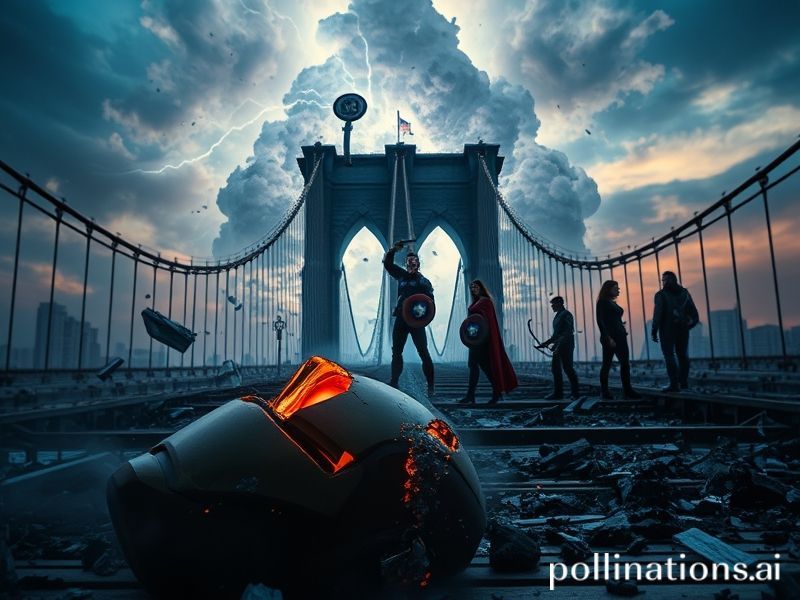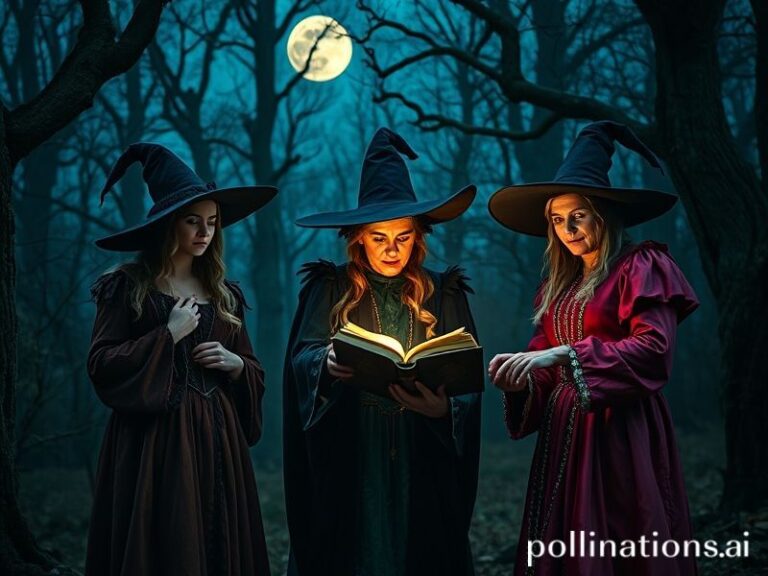Avengers: Doomsday—When the World Roots for Its Own Villain
From the moment the Russo brothers strutted onstage in São Paulo to announce “Avengers: Doomsday,” the planet’s collective cortisol level spiked like an over-caffeinated hedge-fund algorithm. The title alone—Doomsday, not Secret Wars, not Kang Dynasty, but the word you normally reserve for climate reports and intercontinental ballistic press conferences—suggests Marvel has finally admitted what the rest of us worked out somewhere between Brexit and the fifteenth TikTok of a sea turtle choking on a QR code: the end isn’t near, it’s just staggered across three phases and a Disney+ after-credit stinger.
Globally, the reveal felt less like entertainment news and more like an IMF memo. In Mumbai, multiplex stocks jumped six percent on the assumption that Robert Downey Jr.’s return as Doctor Doom (note the delicious upgrade from “genius billionaire playboy philanthropist” to “genius billionaire despot in a tin can”) will goose foot traffic faster than a monsoon sale on pressure cookers. Meanwhile, European exhibitors—still picking popcorn shards out of their hair after the continent’s worst cinema summer since the Treaty of Rome—treated the announcement like a Marshall Plan for reclining seats. If you squinted, you could see NATO defense ministers wondering whether they, too, could pivot to a multiverse franchise and finally balance their budgets.
The casting coup is, of course, the kind of shameless necromancy only Hollywood could pull off without a UN sanction. Downey’s Doom promises to be the Tony Stark who read too much Schopenhauer between rehab stints—a narcissist who decided saving the world was inefficient and subjugating it merely good project management. International relations scholars, a profession that now has the credibility of astrology but with fewer parties, immediately compared the move to France re-electing Napoleon for a fifth republic because the brand tested well in focus groups. Somewhere in Davos, a consultant is already pitching “The Doom Doctrine: How to Monetize Multiversal Anxiety.”
The ripple effects are deliciously absurd. South Korea’s semiconductor giants, already jittery from AI-generated slop flooding the market, now face a new crisis: every teenage screen in Busan will be booked solid for midnight premieres, starving crypto mines of GPUs and possibly lowering Seoul’s ambient temperature by a full degree. Down in Lagos, Nollywood producers are rewriting scripts overnight to insert a local variant of Doom—Baron Ògá of the Fourth Mainland Bridge—while simultaneously petitioning the censorship board to allow at least one post-credit scene featuring jollof rice. And in an exquisite bit of symmetry, Russia’s Ministry of Culture announced it will fast-track its own patriotic superhero epic, “Defenders of the Eternal Rodina,” starring a bear in a mech suit. Somewhere, Stan Lee’s ghost is suing for trademark infringement and losing.
Economically, the announcement functions like a Central Bank for escapism: print enough hype and inflation becomes a spectator sport. Disney’s stock surged, dragging the entire S&P 500 upward like Iron Man towing a helicarrier made of quarterly earnings. Analysts in Hong Kong now track the “Doomsday Index”—a weighted basket of Disney shares, Funko Pop futures, and popcorn futures traded on the Dalian Commodity Exchange—because traditional GDP metrics are too depressing when half your coastline is underwater. The IMF, never missing an opportunity to sound relevant, warned that excessive speculation in cinematic universes could create systemic risk, apparently forgetting that systemic risk is the only growth sector left.
What does it all mean for the average citizen of Earth-1218? Simply this: we have collectively agreed to pay twenty-eight earthly currencies for the privilege of watching a man who once played Charlie Chaplin now play a genocidal wizard in aluminum couture, while our real doomsday clock ticks closer to midnight than a Times Square billboard. The multiverse isn’t a storytelling device; it’s a coping mechanism with merchandising potential. And when the final credits roll and the planet still resembles a heated petri dish, we’ll shuffle out of the theater, blinking at the daylight, and wonder if we were rooting for the wrong Tony all along.
After all, the only thing more powerful than an Infinity Gauntlet is a nostalgic IP. Thanos snapped his fingers and half the universe vanished. Disney just snapped theirs, and half your paycheck did too. Snap. Snap. Applause.







